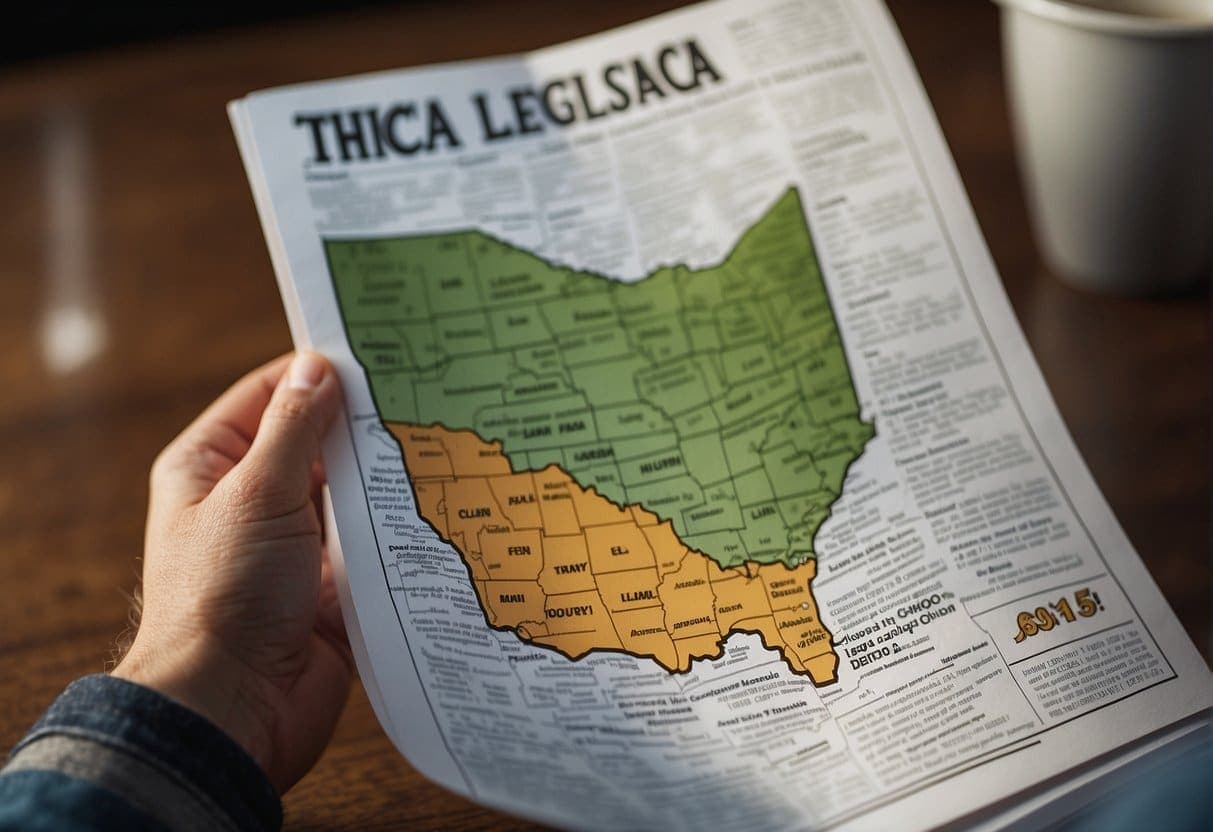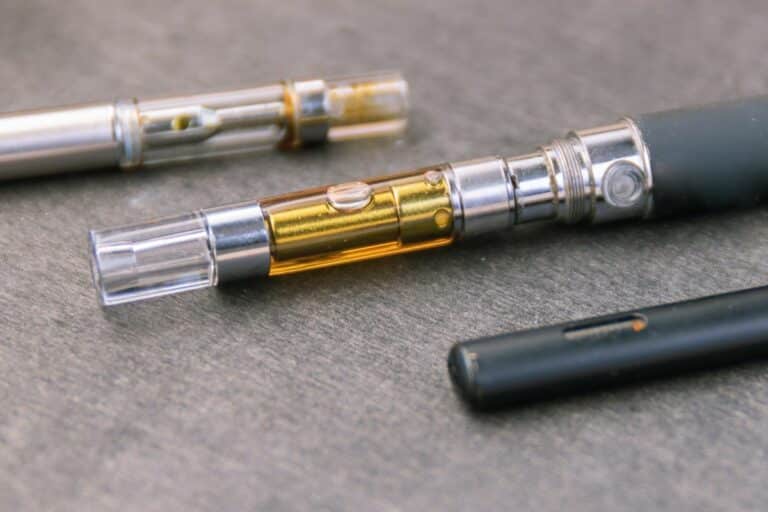Is THCa Legal in Ohio? Understanding State Cannabis Laws
Diving into Ohio’s quirky cannabis codes, are you itching to figure out how tetrahydrocannabinolic acid (THCa), the chill cousin of THC found in fresh green buds, stacks up? Picture this: the moment you light up or let your weed chill, THCa magically turns into THC, the superstar component that sends your spirits soaring. Ohio got cozy with cannabis, rolling out its medical marijuana scheme and laying down the rules for when your health’s on the line. Yet, these regulations shine the spotlight on THC, leaving THCa somewhat in the shadows. Hang tight for the scoop on THCa in the Buckeye State – it’s a ride packed with twists and turns you definitely don’t want to miss out on!
- Overview of THCa
- Legal Framework
- THCa in Ohio
- Consumer Information
- Scientific and Legal Considerations
- Understanding THC Concentrations
- Market and Distribution Dynamics
- Frequently Asked Questions
- What are the regulations surrounding the legality of THCa in Ohio?
- Can the use of THCa result in psychoactive effects?
- Will consuming THCa lead to a positive result on drug screening tests?
- Does Ohio law differentiate between THCa and Delta-8 compounds?
- What are the interstate shipping rules regarding THCa to and from Ohio?
- How does Ohio’s stance on THCa compare with federal law?
Under Ohio’s medical marijuana program, patients with certain medical conditions can legally use cannabis products, but they must adhere to the state’s stringent regulations, especially regarding the use of THC. The permissibility of THCa hinges on its legal interpretation, given that it converts to THC upon decarboxylation, a process that occurs when the substance is heated. The concentration of THC, even when originating from THCa, is a key component in determining whether a cannabis product falls within legal thresholds.
Your understanding of THCa’s legality in Ohio requires a clear distinction between it and its decarboxylated form, THC, which the state regulates. While Ohio law permits the use of medical marijuana, including specific cannabinoids like CBD, it mandates that cannabis products, including those containing THCa, must not exceed certain THC levels. Therefore, while THCa in its raw form has various attributes, its legal status is inherently tied to its potential conversion to THC and the state’s regulations to control psychoactive cannabis compounds.
Overview of THCa
In exploring the complex landscape of cannabis components, you’ll find THCa as a notable cannabinoid that stands out for its unique properties and legal status.
What Is THCa?
Tetrahydrocannabinolic acid (THCa) is a non-psychoactive cannabinoid found primarily in the raw cannabis plant. It is the acidic precursor to THC, the well-known psychoactive component. THCa becomes THC when it is decarboxylated, a process that occurs when cannabis is dried, cured, or heated.
Differences Between THCa and THC
While both compounds originate from the cannabis plant, the main difference between THCa and THC lies in their psychoactive effects. THCa does not produce the psychoactive effects associated with THC. This is because it does not bind readily to the CB1 cannabinoid receptors in your brain. THC, on the other hand, has potent psychoactive effects and is responsible for the “high” associated with cannabis use.
Potential Health Benefits of THCa
The therapeutic potential of THCa is currently being scrutinized by scientists. Although research is still in its infancy, preliminary studies suggest that THCa may offer various health benefits. These include anti-inflammatory and neuroprotective properties. Some users report anecdotal evidence of relief from muscle spasms and pain; however, more clinical studies are needed to substantiate these claims and fully understand the health benefits and therapeutic potential of THCa.
Legal Framework

Understanding the legal nuances of cannabinoids such as THCa in Ohio requires navigating both federal and state law. Your grasp of the federal legal perspective is vital, as it sets the stage for how states like Ohio devise their own regulations.
Federal Legal Status of Cannibinoids
At the federal level, substances are regulated under the Controlled Substances Act (CSA). The Drug Enforcement Administration (DEA) classifies cannabinoids, but a key distinction is made between marijuana-derived cannabinoids and hemp-derived ones. THCa, or tetrahydrocannabinolic acid, is the non-psychoactive precursor to THC found in raw cannabis plants. Its legal status can be ambiguous, as it may be considered a controlled substance under federal law if derived from marijuana, rather than hemp.
The 2018 Farm Bill Explained
The 2018 Farm Bill marked a significant shift by distinguishing between hemp and marijuana. This legislation removed hemp, defined as cannabis and derivatives with a THC concentration of not more than 0.3% on a dry weight basis, from the list of controlled substances. It effectively legalized hemp at the federal level, which implies that cannabinoids derived from hemp, including THCa, fall outside the purview of the CSA, provided they have less than 0.3% THC.
Controlled Substances Act and THCa
Under the Controlled Substances Act, marijuana is classified as a Schedule I drug, which is reserved for substances with a high potential for abuse and no accepted medical use. While THCa itself is not explicitly listed, it is a component of cannabis, and therefore, it could be regulated under the CSA when derived from marijuana. Because THCa converts to THC, a psychoactive compound, upon decarboxylation (commonly through heat application), its legal status can be complex and enforcement may vary.
As you navigate the legality of THCa in Ohio, you must bear in mind these federal legal frameworks, understanding how the intricate details of the law apply to the cannabinoid’s status at both state and national levels.
THCa in Ohio
When considering the legality of THCa, Ohio’s frameworks for regulation and medical use are key aspects you should understand.
State Regulations and Policies
Under Ohio law, cannabis regulations have been developed with attention to ensuring safety and control. THCa, short for tetrahydrocannabinolic acid, is not explicitly listed under Ohio’s controlled substances, but it is the precursor to THC, and products containing THCa could potentially be regarded under the same legal scope as THC if heated or decarboxylated to convert THCa to THC.
Ohio Medical Cannabis Program
Ohio has a Medical Cannabis Program that allows for the use of medical marijuana, including THC, for qualifying patients. However, Ohio Medical Marijuana law mandates that products must meet specific THC concentration limits. These regulations are enforced to ensure that medical cannabis products, potentially including those with THCa, are safely distributed to patients.
Legal Status of THCa Products
The legal status of THCa products in Ohio falls under a grey area due to its relationship with THC. Unlike the psychoactive THC, THCa itself is non-intoxicating. However, as there is the possibility for THCa to convert to THC, one should exercise caution with any THCa products to ensure compliance with Ohio’s stringent cannabis laws. It is advisable to seek products from licensed dispensaries within the Ohio Medical Cannabis Program to avoid legal complications.
Consumer Information

When purchasing THCa products in Ohio, you need to consider labeling accuracy, compliance with state regulations, and the legal risks involved. Your awareness of these factors is crucial for a lawful and safe experience with THCa.
Purchasing THCa Products
When you set out to purchase THCa products, it is essential to buy from licensed retailers. These retailers are the only legal avenue through which you can obtain THCa products. Always check the retailer’s license status to ensure they are compliant with Ohio state laws.
- Licensed Retailer: Make sure they are authorized to sell THCa.
- Product Selection: Choose from the range of THCa products legally available.
Labeling and Compliance
Labeling and compliance with state-regulated standards are critical for consumers. It’s vital that the products you buy have clear labels showing the concentration of THCa and any other cannabinoids present. For instance, labeling standards require that the content of THC and THCa for dried herb is effectively communicated to consumers.
- THC Content: Look for the exact THC or THCa concentration on the label.
- Compliance: Check that the product meets Ohio’s legal requirements.
Legal Risks and Precautions
Be mindful of the legal risks associated with THCa products. Even with THCa’s legality under state law, driving under the influence of marijuana compounds, including THCa, could lead to legal repercussions like Ohio’s marijuana OVI law penalties.
- Legal Limits: Be aware of the possession and consumption limits set by the state.
- Precautions: Don’t operate vehicles or heavy machinery after using THCa products.
Following these guidelines diligently will help ensure that your interaction with THCa products remains within the legal framework established in Ohio.
Scientific and Legal Considerations
As you explore the legality of THCa in Ohio, understanding the scientific nuances and legal frameworks is crucial. This includes the technicalities of extraction techniques, how THCa interacts with other THC isomers, and the implications of its psychoactive effects.
Extraction Techniques and Legality
Extraction techniques such as CO2, ethanol, or hydrocarbon solvents are used to isolate cannabinoids including THCa from the cannabis plant. In Ohio, the legality of cannabis extracts hinges on state law, which allows medical marijuana with specific regulations. However, Ohio’s law lacks scientific validation when it comes to differentiating between lawful extracts and those that lead to intoxication, like those containing delta-9 THC.
Interaction with THC Isomers
THC isomers, such as delta-8, delta-9, and delta-10, are structurally similar compounds with different legal statuses. While delta-9 THC is the most well-known for its psychoactive properties, THCa is its non-psychoactive precursor. Delta-8 and delta-10, often synthesized from legal extracts like CBD, exist in a gray area—less regulated yet potentially intoxicating.
Psychoactive Effects and Legal Implications
Understanding the difference between non-intoxicating cannabinoids like THCa and their psychoactive counterparts is essential. Psychoactive THC, specifically delta-9 THC, determines the legal status of the substance in Ohio. If an extraction technique yields a product with a high concentration of delta-9 THC, it could be deemed illegal under federal law, despite any state-level allowances for medicinal use.
Understanding THC Concentrations
When you’re navigating the complexities of THC products, it’s critical to understand the specifications that determine legality and compliance. THC concentration is the paramount factor affecting legalities, such as in Ohio, and the ways they’re tested and labeled.
Dry Weight Basis and Total THC
Dry Weight Basis refers to the measurement of THC concentration expressed as a percentage of the total weight of the product after it has been dried. This measurement is crucial because it standardizes the method for evaluating THC content across different types of cannabis and hemp products.
For instance, when examining the legality of a cannabis product under Ohio law, one must consider the Total THC content, which encapsulates all forms of THC present, including THCa, a non-psychoactive precursor that can convert into THC. Calculating Total THC on a dry weight basis helps regulators ensure that products do not exceed legal THC thresholds established by Ohio law.
Testing and Label Requirements
Testing protocols for THC are rigorous, supporting both consumer safety and legal compliance. You’ll find that products undergo lab analyses to quantify levels of THC Concentration, and these figures are crucial for both labeling practices and understanding potential impacts on Drug Tests.
In terms of Labeling, precision is paramount. Products must clearly state the THC content, often in milligrams, to inform consumers and comply with regulations. Precise labeling is also essential if you’re subjected to a Drug Test, as higher THC concentrations could influence test outcomes more significantly. Knowledge of this information helps you make informed decisions about the products you choose to consume.
Market and Distribution Dynamics
In Ohio, the market and distribution dynamics for tetrahydrocannabinolic acid (THCa) are shaped by strict regulations and consumer demands. As you navigate through the complexities of the legal framework, it’s essential to understand the roles that stakeholders play in providing legal hemp-derived products.
Role of Retailers and Manufacturers
Retailers are pivotal in the supply chain, ensuring that legal THCa products reach you, the customer. They work hand in hand with manufacturers who extract and prepare THCa from hemp, which contains less than 0.3% THC by dry weight, adhering to the 2018 Farm Bill. In Ohio, manufacturers and retailers must both be licensed, which includes stringent application processes and adherence to quality control measures.
This partnership is essential in maintaining a compliant market where distribution channels effectively bridge the gap between the creation of hemp-derived products and their eventual sale. They regularly analyze consumer needs to stock products likely to be in demand.
Consumer Demands and Product Availability
Your preferences as a customer directly influence what products are available in the Ohio market. High demand for legal, hemp-derived THCa products has resulted in a diverse array of offerings, from oils to edibles. Retailers track these preferences to ensure stock availability aligns with the most sought-after products, driving both the economics of the market and the spectrum of products manufactured.
Distribution channels have been established to meet the expectations of efficiency and legality, meaning products containing THCa can be available to you in various retail settings across Ohio, provided they meet the state’s regulatory guidelines for hemp-derived substances.
Frequently Asked Questions
Understanding THCa’s legal landscape in Ohio is crucial due to its complex nature and evolving regulations.
What are the regulations surrounding the legality of THCa in Ohio?
In Ohio, THCa is technically not listed as a scheduled substance, but the state’s law prohibits driving under the influence of marijuana-related substances, which may include THCa if impaired driving is detected. For details on the risks associated with driving as a medical marijuana patient in Ohio which could be relevant, Ohio’s marijuana OVI law explains that a court may defer to the legislative assembly on matters concerning substance concentration in the body.
Can the use of THCa result in psychoactive effects?
THCa on its own does not produce psychoactive effects; however, when heated, THCa converts into THC, which is psychoactive. This transformation occurs during smoking, vaping, or cooking, commonly known as decarboxylation.
Will consuming THCa lead to a positive result on drug screening tests?
THCa can potentially be converted to THC in your body, which most drug tests target. There might not be a distinction between THCa and THC on many standard drug screening tests, leading to a positive result if converted THC levels are detectable.
Does Ohio law differentiate between THCa and Delta-8 compounds?
Ohio law regulates all isomers of THC, including Delta-8 THC. Though similar, THCa and Delta-8 THC are chemically distinct; however, both fall under scrutiny in Ohio, notably with Delta-8 THC being a point of contention due to its psychedelic effects and legal gray area. It’s important to view the high stakes regulatory questions at play when considering these compounds.
What are the interstate shipping rules regarding THCa to and from Ohio?
Interstate shipping of any cannabis-related compounds, including THCa, remains a complex issue due to differing state laws and federal restrictions. Since THCa can be considered a derivative of hemp, which is federally legal, its shipping might not be restricted, but state-specific laws must always be observed.
How does Ohio’s stance on THCa compare with federal law?
Federally, THCa is not listed as a controlled substance, but since it is a precursor to THC, federal law may indirectly affect THCa’s legality. Ohio decriminalization laws have influenced marijuana use in the state, reflecting a series of legal nuances that differ from some federal drug policies.










